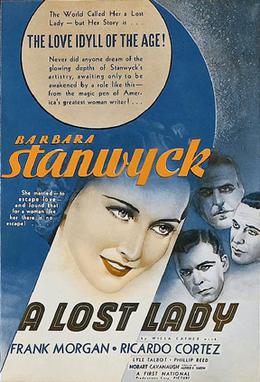
Willa Sibert Cather was an American writer known for her novels of life on the Great Plains, including O Pioneers!, The Song of the Lark, and My Ántonia. In 1923, she was awarded the Pulitzer Prize for One of Ours, a novel set during World War I.

Alexander's Bridge is the first novel by American author Willa Cather. First published in 1912, it was re-released with an author's preface in 1922. It also ran as a serial in McClure's, giving Cather some free time from her work for that magazine.

Lucy Gayheart is Willa Cather's eleventh novel. It was published in 1935. The novel revolves round the eponymous character, Lucy Gayheart, a young girl from the fictional town of Haverford, Nebraska, located near the Platte River.
"The Burglar's Christmas" is a short story by Willa Cather. It was first published in Home Monthly in 1896 under the pseudonym of Elizabeth L. Seymour, her cousin's name.
"Jack-a-Boy" is a short story by Willa Cather. It was first published in Saturday Evening Post in March 1901.
"The Way of the World" is a short story by Willa Cather. It was first published in Home Monthly in April 1898.
"A Gold Slipper" is a short story by Willa Cather. It was first published in Harper's in January 1917.
"Her Boss" is a short story by Willa Cather. It was first published in Smart Set in October 1919.
"A Night at Greenway Court" is a short story by Willa Cather. It was first published in Nebraska Literary Magazine in June 1896. Four years later a revised version was published in the Library.
"Tommy, the Unsentimental" is a short story by Willa Cather. It was first published in Home Monthly in August 1896.
"A Resurrection" is a short story by American writer Willa Cather. It was first published in Home Monthly in April 1897.
"The Affair at Grover Station" is a short story by Willa Cather. It was first published in Library in June 1900 in two installments, and reprinted in the Lincoln Courier one month later. The story is about a geological student asking an old friend of his about the recent murder of a station agent.
"The Profile" is a short story by Willa Cather. It was first published in McClure's in June 1907.
"The Garden Lodge" is a short story by Willa Cather. It was first published in The Troll Garden in 1905
"The Marriage of Phaedra" is a short story by Willa Cather. It was first published in The Troll Garden in 1905
"The Treasure of Far Island" is a short story by Willa Cather. It was first published in New England Magazine in October 1902.

My Mortal Enemy is the eighth novel by American author Willa Cather. It was first published in 1926.

A Lost Lady is a 1934 American drama film directed by Alfred E. Green and starring Barbara Stanwyck, Frank Morgan and Ricardo Cortez. It is based on the 1923 novel A Lost Lady by Willa Cather, with a screenplay by Gene Markey and Kathryn Scola. Warner Bros. had produced a 1924 silent film based on the story, starring Irene Rich.

The Troll Garden is a collection of short stories by Willa Cather, published in 1905.

The Life of Mary Baker G. Eddy and the History of Christian Science (1909) is a highly critical account of the life of Mary Baker Eddy, the founder of Christian Science, and the early history of the Christian Science church in 19th-century New England. It was published as a book in November 1909 in New York by Doubleday, Page & Company. The original byline was that of a journalist, Georgine Milmine, but a 1993 printing of the book declared that novelist Willa Cather was the principal author; however, this assessment has been questioned by more recent scholarship which again identifies Milmine as the primary author, although Cather and others did significant editing. Cather herself usually wrote that she did nothing more than standard copy-editing, but sometimes that she was the primary author.






